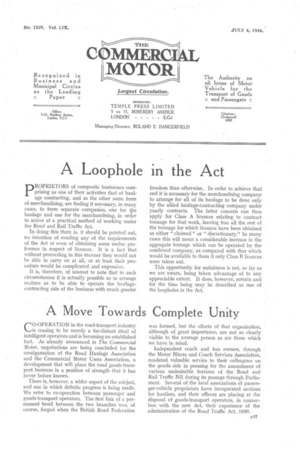A Loophole in the Act
Page 35

If you've noticed an error in this article please click here to report it so we can fix it.
pROPRIETORS of composite businesses comprising as one of their activities that of haulage contracting, and as the other some form of merchandising, are finding it necessary, in many cases, to form separate companies, one for le haulage and one for the merchandising, in order to arrive at a practical method of working under the Road and Rail Traffic Act.
In doing this there is it should be pointed out, no intention of evading any of the requirements of the Act or even of obtaining some undue preference in respect of licences. It is a fact that without proceeding in this manner they would not be able to carry on at all,' or at least their procedure would be complicated and expensive.
It is, therefore, of interest to note that in such circumstances it is actually possible so to arrange matters as to be able to operate the haulagecontracting side of the business with much greater freedom than otherwise.. In order to achieve that end it is necessary for the merchandising company to arrange for all of its haulage to be done only by the allied haulage-contracting company under yearly contracts. The latter concern can then apply for Class A licences relating to contract tonnage for that work, leaving free all the rest of the tonnage for which licences have been obtained as either " claimed" or "discretionary." In many cases this will mean a considerable increase in the aggregate tonnage which can be operated by the combined company, as compared with that which would be available to them if only Class B licences were taken out.
This opportunity for unfairness is not, so far as we are aware, being taken advantage of to any appreciable extent. It does, however, remain and for the time being may be described as one of the loopholes in the Act.




































































































